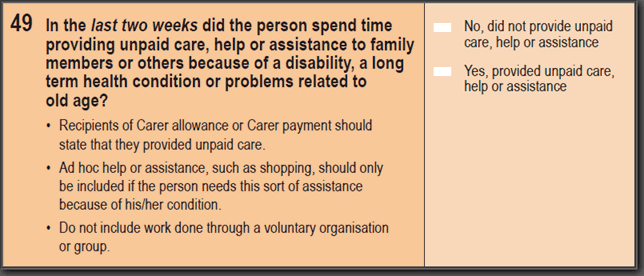Unpaid Assistance to a Person with a Disability (UNCAREP)
This variable records people who, in the two weeks prior to Census night, spent time providing unpaid care, help or assistance to family members or others because of a disability, long term illness or problems related to old age. This includes people who are in receipt of a Carer Allowance or Carer Payment but does not include work done through a voluntary organisation or group.This variable is applicable to all persons aged 15 years or older.
How this variable is created
The responses to this question are captured automatically from mark box responses on the form so the risk of processing error is minimal. In 0.6%, respondents provided an incorrect combination of responses.
Variable history
Questions on unpaid work, including unpaid assistance to a person with a disability, were first asked for the 2006 Census. These questions were repeated for 2011 and 2016. No changes were made for 2016.
Non-response rate
Item non-response rates are a measure of how many people did not respond to a particular question as a proportion of the total number of people the question was applicable to. In this instance the response is left as not stated.
The majority of item non-response is attributable to the people who did not respond to the Census at all. Refer to item non-response rates for more information. The second and smaller contributor to item non-response is when people return a Census form but may not answer a particular question(s). For more information, refer to Understanding Census data quality.
The non-response rate for this variable was 8.9% (8.5% in 2011).
Data usage notes
This question asked about care or assistance provided to another person to assist with daily activities because of disability, long term illness or problems related to old age in the two weeks prior to the Census. No information on the amount of time spent on providing such unpaid care was collected. Further to the instructions in the question respondents were directed to include (but is not limited to): bathing, dressing, toileting and feeding someone; helping someone to move around; helping someone be understood by others; providing emotional support and helping maintain friendships and social activities; helping with or supervising medication or dressing wounds; cleaning, laundry, cooking, managing diets and preparing meals; performing housework, light household repairs or maintenance, managing household finances; driving or accompanying someone to appointments or activities
Care should be taken when comparing Census data on Unpaid Assistance to a Person with a Disability with information from other surveys and publications. Definitions can differ between different statistical collections and may not match Census definitions.
Further information
A definition of Unpaid Assistance to a Person with a Disability is available in the 2016 Census Dictionary.
For more information about Unpaid work, see the Glossary for Unpaid Work in the 2016 Census Dictionary.
Additional sources of information regarding caring can be found in other ABS publications and associated collections. Refer to the Disability home page on the ABS website.
Household form question image
Question 49 as it appeared on the 2016 Census Household Paper Form:

A text only version of the online Census Household form is available from the Downloads tab.
 Print Page
Print Page
 Print All
Print All